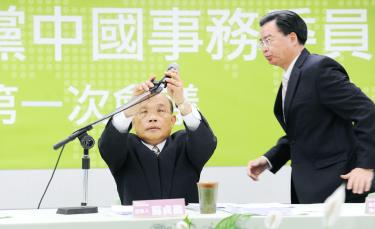The Democratic Progressive Party (DPP) took the first step toward the formulation of its cross-strait policy as its nine-member China Affairs Committee held its first meeting yesterday in the face of mounting cross-strait challenges.
“Almost every member of the committee agreed that the DPP’s core values have withstood the test of time and changing political situation. Discussions over strategic options and substantial policies are what this committee has to accomplish in the future,” committee spokesperson Cheng Wen-tsan (鄭文燦) told a press conference.
The two-hour meeting gathered all the committee members, namely committee convener and DPP Chairman Su Tseng-chang (蘇貞昌), former DPP chairperson Tsai Ing-wen (蔡英文), former premier Frank Hsieh (謝長廷), Greater Kaohsiung Mayor Chen Chu (陳菊), former premier Yu Shyi-kun, DPP legislative caucus whip Ker Chien-ming (柯建銘), Greater Tainan Mayor William Lai (賴清德), former National Security Council secretary-general Chiou I-jen (邱義仁) and former DPP secretary--general Wu Nai-jen (吳乃仁).
Chen Ming-tung (陳明通), a National Taiwan University professor who served as Mainland Affairs Council chairman under the DPP administration, gave the keynote speech, “Taiwan’s China agenda.”
In it, he highlighted a “Taiwan Dream” based on the Taiwanese people’s high degree of consensus on sovereignty, security, human rights and economic benefits, Cheng quoted Chen as saying.
Underlining the hierarchy of the DPP’s cross-strait policy, Chiou said the party should be able to assess its basic position, strategic options and policymaking to counter persistent challenges from Beijing, Cheng said.
Former premiers Yu and Hsieh, who hold very different attitudes toward China, both laid out their main ideas in the meeting, with Yu saying that he would support any policy as long as it does not harm national interests and does not violate the DPP’s Resolution on Taiwan’s Future (台灣前途決議文) and its Normal Country Resolution (正常國家決議文).
Hsieh, who did not join the committee until this week, played down the differences between his moderate China policy and other members’ more hawkish positions, saying that the only difference between them could be his initiative of “constitutions with different interpretations (憲法各表).”
While the spokesperson said the atmosphere of the meeting was generally convivial, a DPP member who was at the meeting said on condition of anonymity that Chiou argued with Hsieh about the DPP’s attitude to the Republic of China (ROC) Constitution.
Chiou said the DPP does not accept the ROC Constitution in its entirety, while Hsieh believed the opposite, the source said.
The committee’s second meeting is scheduled for July 11, DPP Department of China Affairs director Honigmann Hong (洪財隆) said, adding that the meetings would be held every two months.
Source: Taipei Times - 2013/05/10





















